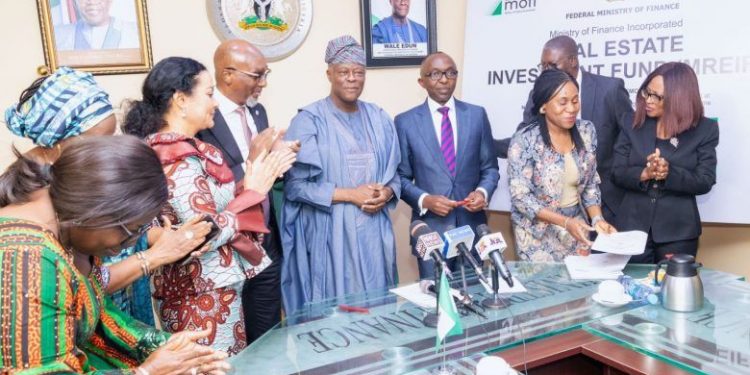The Federal Government recently announced that it was setting out N250 billion real estate investment fund to bridge the gap in housing provision in the country.
The Real Estate Investment Fund is managed by Ministry of Finance Incorporated (MOFI) and is aimed at closing the housing finance gap and fostering economic growth.
The fund, announced through the Ministry of Finance’s official social media platform, offers low-cost, long-term mortgage financing with repayment terms of up to 25 years. This stands in stark contrast to the high-interest, short-tenor loans currently provided by commercial banks, making homeownership more accessible for Nigerians.
Speaking at the signing ceremony, Mr. Wale Edun, Minister of Finance and Coordinating Minister of the Economy, emphasized the fund’s transformative potential.
“This initiative bridges the housing finance gap, stimulates the construction sector, and aligns with President Bola Ahmed Tinubu’s vision to promote homeownership, create jobs, and drive economic development,” he said.
Structure and objectives
The MREIF is structured as a public-private partnership (PPP), with a two-phase funding approach:
First Tranche: ₦150 billion to kick-start private sector participation.
Second Tranche: ₦100 billion to further expand the program.
The fund incentivizes developers to construct affordable homes, thereby stimulating activity in the real estate and construction sectors.
Key Benefits
Affordable homeownership: Long-term mortgages at low costs allow Nigerians to own homes and build generational wealth.
Economic growth: Boosts construction activity, creating jobs and driving economic development.
Private Sector Collaboration: Encourages private developers to participate in providing affordable housing solutions.
Stakeholder support
Dr. Armstrong Takang, Managing Director of MOFI, highlighted the broader implications of the fund:
“The MREIF provides an opportunity for Nigerians to build generational wealth through sustainable homeownership,” he noted.
The launch event drew participation from government officials, financial institutions, and private sector leaders, reflecting strong support for the initiative.
With its focus on bridging the housing deficit and fostering sustainable homeownership, the MREIF is set to reshape Nigeria’s housing sector while contributing to economic stability and growth.


